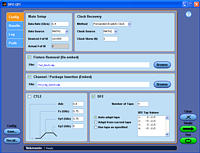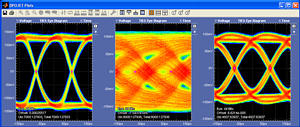
與我們聯絡
與 Tek 業務代表即時對談。 上班時間:上午 6:00 - 下午 4:30 (太平洋時間)
致電
請致電
與 Tek 業務代表即時對談。 上班時間:上午 8:30 - 下午 5:30 (太平洋時間)
下載
下載手冊、產品規格表、軟體等等:
意見回饋
Intel® Quick Path Interconnect Test Automation Software
DPOQPI

Features & Benefits
- Channel Embedding and Fixture De-embedding
- Two Types of Equalizer: CTLE + DFE
- Configurable Clock Recovery
- Eye Diagrams for Performance Visualization
- Histogram Accumulation and Export to an Intel-prescribed CSV File Format
- Automatic Test Termination at a Goal Population
- Remote Programmable Interface
Intel® Quick Path Interconnect, sometimes referred to as "QPI", is an Intel-proprietary processor-to-processor interface that will be central to multiprocessor architectures for the next several years. Version 1.0 of QPI, running at 6.4 GB/s, is already common in current-generation commercial products. The next generation of this bus is V1.1. Although target data rates for QPI V1.1 are held as Intel-proprietary, the rates are going up. As a result, complex equalization is expected to be required, system modeling is a must, and advanced analysis of crosstalk effects may be necessary to separate jitter properly and project eye closure accurately.
DPOQPI is a test automation software package that Tektronix has developed working in close partnership with the Intel engineers who own the QPI V1.1 specification and test procedures. The software simplifies user operation by presenting only the features required for PHY testing of the QPI V1.1 bus that may be needed when designing and validating node controllers.
DPOQPI combines certain key capabilities found in SDLA and DPOJET without requiring the user to have familiarity with all of the features of those underlying applications, nor the advanced processing techniques being employed. The user interface is designed to be focused, easy to set up, and simple to use.
Intel® QPI V1.1 Bus

Figure 1 – Test Topology.

Figure 2 – Eyes at test fixture, end of channel, and post-EQ.
QPI V1.1 is a point-to-point data communication bus with the following characteristics:
- Multilane architecture
- Unidirectional signaling
- Differential signal pairs (for both clock and data), DC coupled
- Forwarded clock for each link
- System reference clock (shared by Transmitter and Receiver at both ends of the link)
- Transmitter and Receiver equalization
- SSC capability
PHY testing of this bus calls for some familiar measurements that are common to other high-speed serial buses, such as jitter, eye height, eye width, etc. Many of these measurements can be found in the DPOJET application. We have added two new measurements to DPOJET specifically for QPI V1.1, “Eye High” and “Eye Low” which use histograms to record the voltage levels for logic High and Low states.
However, QPI V1.1 PHY testing also requires the ability to embed S-parameters to model the transmit channel, the ability to de-embed test fixture effects, use of CTLE and/or DFE equalization, etc – all of which potentially add to the complexity of configuring the measurement setup. The DPOQPI software combines all of the key capabilities mentioned above – and others – into an application-specific package that provides all the needed functions and controls in one simplified user interface.
The software also features data logging and a remote programmable interface command set, so test operation can be controlled from an external management program and test results can be exported in the desired format.
Ordering Information
QPI*1
|
Model |
New Instrument Orders |
Product Upgrades |
Floating Licenses |
|---|---|---|---|
|
Intel® Quick Path Interconnect (QPI) PHY Test Automation Software. |
|||
|
DPO/DSA/MSO70K Series |
Opt. QPI |
Opt. DPO-UP QPI |
Opt. DPOFL-QPI |
*1 Requires Option DJA. DJA is standard on DSA70K Series oscilloscopes.

